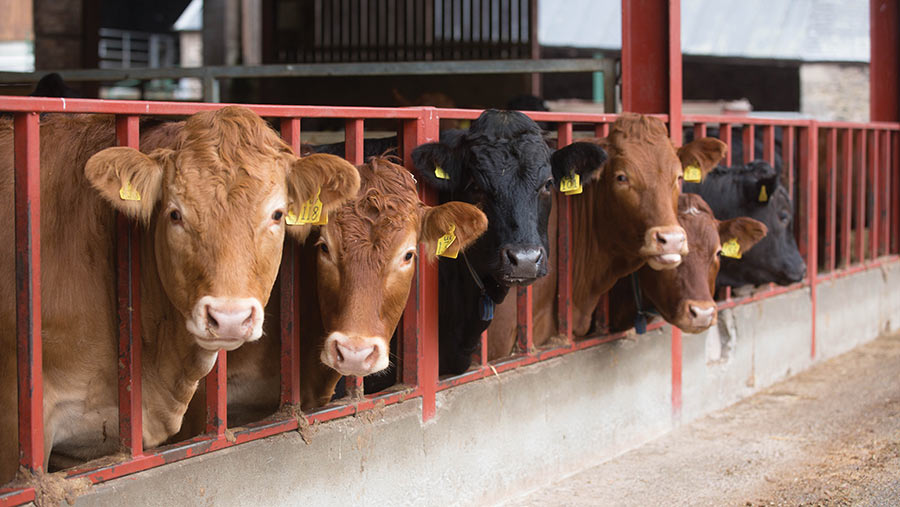Fear of underselling cattle as bases approach 400p/kg
 © Tim Scrivener
© Tim Scrivener Prime cattle vendors should check the beef trade before negotiating deals to ensure a fair price is achieved for their cattle.
This is the message from many in the industry following another 5p/kg price rise from many deadweight buyers over the weekend.
Some finishers are negotiating at base prices of 398p/kg with Scotland’s big processors, while bases of 392p/kg and 395p/kg are possible in Northern Ireland and northern England, respectively.
See also: Store and prime trade buoyant with cattle 5% tighter
Melton Mowbray
With cattle numbers tight and demand strong, Melton has reported a flying trade, despite mixed-quality entries, along with strong bidding for O-grade cattle and even those creeping over 30 months.
Last week (10 March), 46 steers averaged 211.17p/kg, 12 heifers averaged 212p/kg and 14 young bulls averaged 180.43p/kg. This is about 30-40p/kg up on the year.
“This is the best position the beef trade has been in for a long time,” said prime cattle auctioneer Martin Lloyd. “We could sell another 40 to 50 head of prime cattle each week.
“However, it’s on a knife edge in that if trade slips, finishers will be exposed to big losses on the expensive short-keep store cattle they’ve bought, which are making £1,250-£1,300.
“While I don’t think cattle will get dearer, I think trade should be OK well into the autumn, if not later.”
Lancaster
Tight beef supplies have seen strong money paid for fed and ex-parlour cull cows at Lancaster, said North West Auctions livestock auctioneer Matthew Probert.
Trade has been noticeably strong for the past six to eight weeks. Dairy cows are about 10-15p/kg dearer than during the autumn glut, added Mr Probert.
“I believe that we could sell half as many cows again without having any effect on the trade,” he told Farmers Weekly.
He said fed suckler cows had hit 150-180p/kg and recent trade had peaked with a Limousin at 209.5p/kg and an Angus at 199.5p/kg.
More buyers had come to Lancaster recently to buy cows for feeding, an enterprise that could see more interest in the coming months when spring grazing becomes available.
One-third of Lancaster’s dairy-heavy cow entry made more than £1,000 last week (12 March) with a further 25% of the entry between £900 and £1,000 a head.
Even the leanest out-of-parlour cows are making more than 100p/kg, with boning-out cattle at 98-120p/kg recently. At the stronger end, Friesians topped at £1,248 and £1,268 a head, and an Ayrshire hit £1,091 (149.5p/kg).
